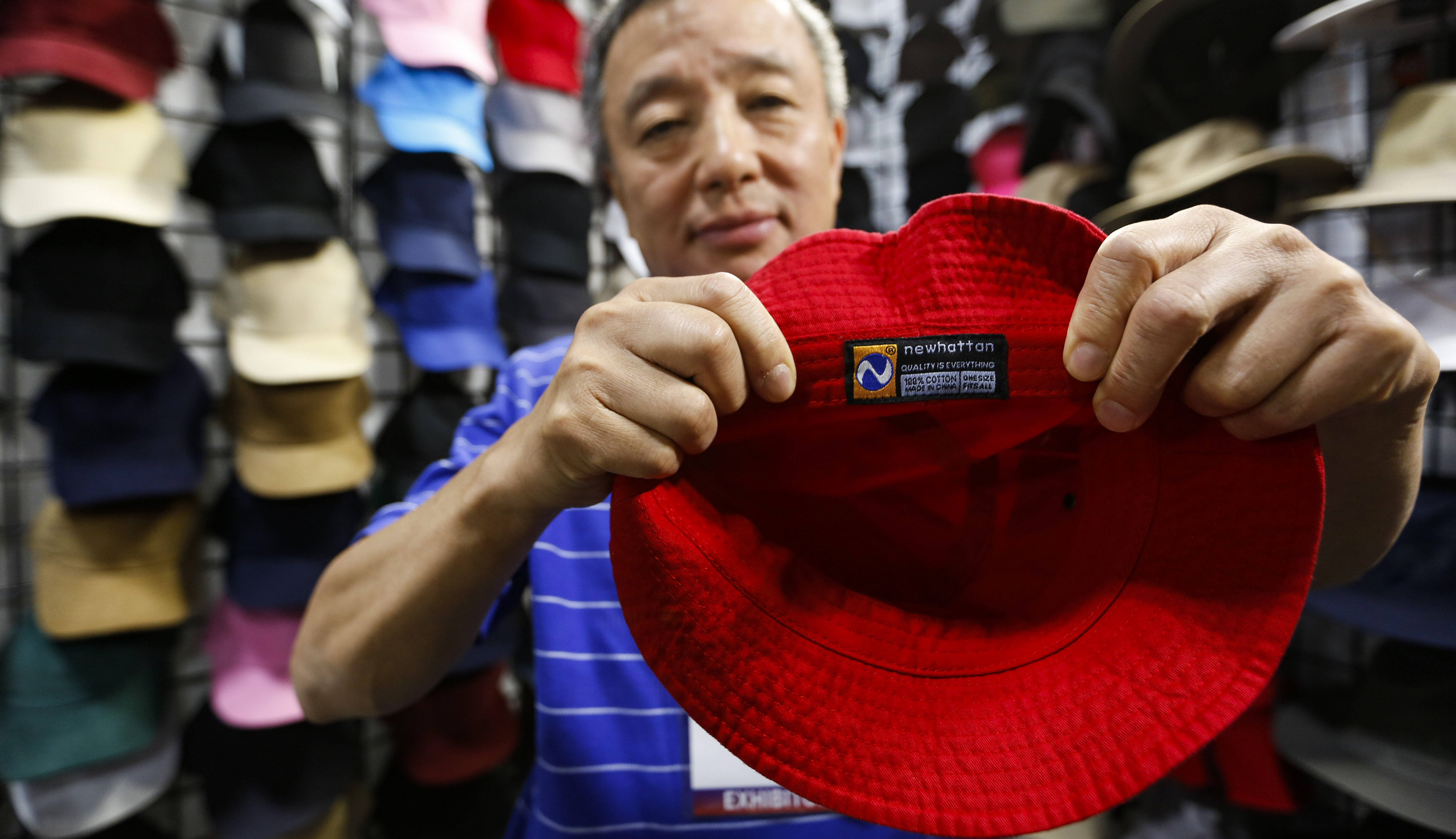
An exhibitor works at her booth at the Offprice Show in Las Vegas, the United States, Aug. 11, 2019. The four-day Off Price Show was opened on Aug. 10 in Las Vegas, selling clothing, footwear and accessories. (Xinhua/Li Ying)
"This tariff makes absolutely no sense. It's just passed along to the consumers. It's another tax mostly on the middle class -- again -- and it hurts our farmers," a U.S. businessman said.
Buyers and sellers at the U.S. Off Price Show in Las Vegas felt the chill and unease, as fears of escalating tariffs, initiated by the United States, took their toll.
by Julia Pierrepont III, Heng Huang
LAS VEGAS, the United States, Aug. 13 (Xinhua) -- "There is a lot of fear in the marketplace, people are worried," Jimmy Gindi, a New York-based footware seller said Sunday at the Sands Expo & Convention Center in Las Vegas.
There was a distinct feeling of unease in the aisles of the semi-annual U.S. Off Price Show (OPS) held this weekend, as fears of escalating tariffs between the United States and China took their toll.
At the OPS, apparel, shoes and accessory buyers and sellers from all over the world meet to keep current with global fashion trends, source cut price apparel and manufacturers, and find retailers ready to snap up their wares.
However, many goods traded here could be impacted by escalating tariff war ignited by the White House one year ago.

An exhibitor shows a hat made in China at the Off Price Show in Las Vegas, the United States, Aug. 11, 2019.(Xinhua/Li Ying)
With China supplying an estimated 50 percent to 80 percent of the goods on sale at the trade fair, buyers and sellers were feeling the chill as the clock counts down to the next round of Trump Administration tariff hikes which is scheduled to be imposed from Sept.1, after a daunting year under the old tariffs.
But Gindi pointed out: "Other places are still more expensive than China, even with the tariffs. We have good relationships with China -- 30 years we've been there, so we're not going anywhere."
"But, we can't just eat a 10 percent or 15 percent percent increase. We can't afford it, so some of that has to get passed on to American consumers."
Tricia Barglof, the executive director of the OPS, told Xinhua that many of the exhibitors source their products from China.
"They're looking for deals, products, anything that they can bring back to the U.S.," she said. "But they'll find it a little bit more challenging to find goods at competitive prices."
She explained: "So everybody is talking about the trade war. They are cautiously watching what the new U.S.-China trade relations are and how they're going to impact on their business."
"They know that it's going have an impact, but don't quite know how bad it is going to be," she told Xinhua.

An exhibitor poses with clothes made in China at the Off Price Show in Las Vegas, the United States, Aug. 11, 2019. (Xinhua/Li Ying)
Grayson Shearing from a department store chain in the Oklahoma state that gets much of their stock from closeouts of goods from China, South Korea, Pakistan and Vietnam, said, "So far, we haven't seen any increases. But maybe the new ones in September will hit us."
But Elaine Byrne who runs Groovy Goods, a Bohemian, 70s retro shop in the state of Iowa, is already feeling the pinch. "This tariff makes absolutely no sense. It's just passed along to the consumers. It's another tax mostly on the middle class -- again -- and it hurts our farmers."
A prominent American wholesaler, Dan Smith from Capsmith, with a 30-year history with boots on the ground with Chinese manufacturers from Shenzhen, to Yangzhou, to Qingdao, was outspokenly opposed to the U.S. tariffs on China.
"They're not helping me. We're the ones paying them, not the Chinese. It comes right out of my bank account," he told Xinhua.
He continued: "I'm definitely not for the trade wars with China. We have a great relationship with a lot of our suppliers. If we have any problems, we deal with the suppliers directly, just like we would if they're here in the United States. We don't need the government for that."
He's increasingly frustrated with politicians who are unresponsive to his company's plight. "I've tried to give my two cents worth, but it falls on deaf ears and it just keeps getting worse," he lamented.
"Enough is enough. The election is coming up in two years. I voted for Trump last time, but I can't see that happening the next time around."

Purchasers attend the Off Price Show in Las Vegas, the United States, Aug. 11, 2019. (Xinhua/Li Ying)
The Off Price Show's executive director, Tricia Barglof, advised her clients to ride through the tough times and stay focused on the future.
"Trade shows are always going to exist -- they will continue to be relevant because you still need to understand the quality of the goods with the touch and feel of a product in your hand rather than just seeing it on your computer screen."
She encourages anyone who missed this year's August show to make sure to attend the winter show in Las Vegas to be held from Feb. 3 to 6, which they are expanding to include more beauty and home and gift products to compensate for the bite the tariffs are taking.
"If you want to stay competitive in this industry, you can't afford to miss it," she said.



